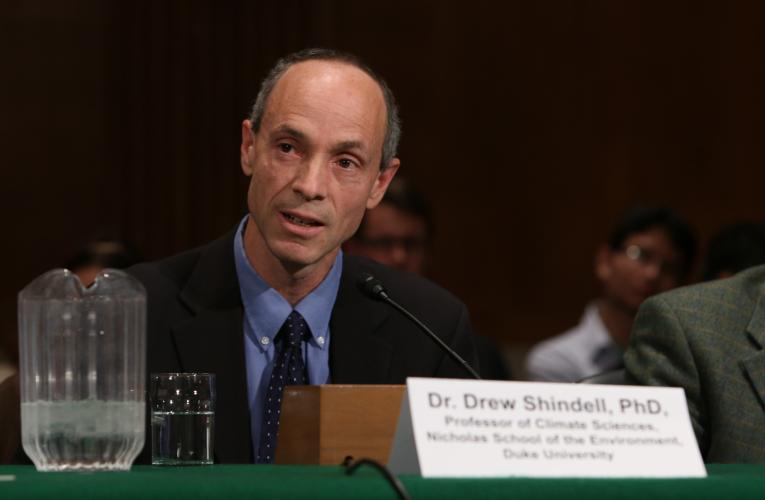DURHAM, N.C. – Drew T. Shindell, professor of climate sciences at Duke University’s Nicholas School of the Environment, testified before the U.S. Senate Committee on Environment and Public Works on December 2 about the environmental, economic and human health benefits of reducing emissions of short-lived climate pollutants (SLCPs) under the Super Pollutants Act of 2014.
Air pollution linked to methane, black carbon, tropospheric ozone and other SLCPs “is literally killing people,” Shindell told the committee. “It is the leading environmental cause of premature death, leading to more than 7 million premature deaths per year globally.”
Many of the SLCPs that contribute to air pollution also drive climate change, he explained.
Aggressively reducing emissions of these compounds, particularly methane and black carbon, could slow the rate of global warming by about half over the next several decades and save more than 45 million lives, “all at a relatively modest cost,” Shindell said.
Additionally, he said, reductions in tropospheric ozone emissions would boost the agricultural economy and enhance food security for billions of people worldwide by increasing global crop yields by about 1 billion metric tons. The largest gains would likely occur in China, India and the United States.
Achieving these goals is possible under the Super Pollutants Act of 2014, he told the senators, because the bill strategically targets industries and activities where emissions reductions would yield the greatest societal benefits. The bill’s efforts to promote financing to help underwrite costs associated with emissions reductions would address a major barrier to its implementation.
Senators in attendance at the hearing included Sen Barbara Boxer (D-Cal.), Sen. Chris Murphy (D-Conn.), Sen. Sheldon Whitehouse (D-R.I.), Sen. Jeff Merkley (D-Ore.), Sen. David Vitter (R-La.) and Sen. Mike Crapo (R-Idaho).
You can read Shindell’s full written testimony at http://www.epw.senate.gov/public/index.cfm?FuseAction=Files.View&FileStore_id=d0c623bf-e442-47c2-b5a3-d82730f1cc62.
You can view an archived webcast of the full hearing at http://www.epw.senate.gov/public/index.cfm?FuseAction=Hearings.Hearing&Hearing_id=dfd1b078-9d64-35a4-b11e-69c8a9939f03.
A prolific researcher with more than 100 peer-reviewed publications to his credit, Shindell is widely cited for his work using climate models to investigate connections between climate change, air quality and chemical changes in the atmosphere, including the depletion of Earth’s ozone layer.
He has testified on climate issues before both houses of Congress, the World Bank and the United Nations Framework Convention on Climate Change, and developed a climate change course with the American Museum of Natural History. He chaired the 2011 Integrated Assessment of Black Carbon and Tropospheric Ozone by the UN Environment Programme and World Meteorological Organization, and was a coordinating lead author on the 2013 Fifth Assessment Report of the Intergovernmental Panel on Climate Change. He currently chairs the scientific advisory panel to the Climate and Clean Air Coalition of nations, intergovernmental organizations and non-governmental organizations.
Shindell joined the Nicholas School faculty earlier this year. Prior to that, he was a climatologist at the NASA Goddard Institute for Space Studies.
###
